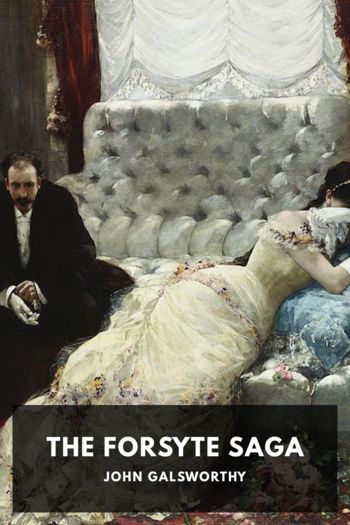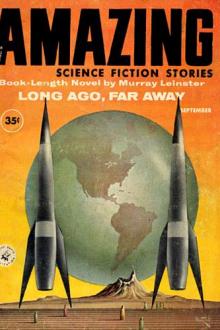The Forsyte Saga - John Galsworthy (best english novels for beginners .txt) 📗

- Author: John Galsworthy
Book online «The Forsyte Saga - John Galsworthy (best english novels for beginners .txt) 📗». Author John Galsworthy
June was at home; she had come down hotfoot on hearing the news of Jolly’s enlistment. His patriotism had conquered her feeling for the Boers. The atmosphere of his house was strange and pocketty when Jolyon came in and told them of the dog Balthasar’s death. The news had a unifying effect. A link with the past had snapped—the dog Balthasar! Two of them could remember nothing before his day; to June he represented the last years of her grandfather; to Jolyon that life of domestic stress and aesthetic struggle before he came again into the kingdom of his father’s love and wealth! And he was gone!
In the afternoon he and Jolly took picks and spades and went out to the field. They chose a spot close to the russet mound, so that they need not carry him far, and, carefully cutting off the surface turf, began to dig. They dug in silence for ten minutes, and then rested.
“Well, old man,” said Jolyon, “so you thought you ought?”
“Yes,” answered Jolly; “I don’t want to a bit, of course.”
How exactly those words represented Jolyon’s own state of mind!
“I admire you for it, old boy. I don’t believe I should have done it at your age—too much of a Forsyte, I’m afraid. But I suppose the type gets thinner with each generation. Your son, if you have one, may be a pure altruist; who knows?”
“He won’t be like me, then, Dad; I’m beastly selfish.”
“No, my dear, that you clearly are not.” Jolly shook his head, and they dug again.
“Strange life a dog’s,” said Jolyon suddenly: “The only four-footer with rudiments of altruism and a sense of God!”
Jolly looked at his father.
“Do you believe in God, Dad? I’ve never known.”
At so searching a question from one to whom it was impossible to make a light reply, Jolyon stood for a moment feeling his back tried by the digging.
“What do you mean by God?” he said; “there are two irreconcilable ideas of God. There’s the Unknowable Creative Principle—one believes in That. And there’s the Sum of altruism in man—naturally one believes in That.”
“I see. That leaves out Christ, doesn’t it?”
Jolyon stared. Christ, the link between those two ideas! Out of the mouth of babes! Here was orthodoxy scientifically explained at last! The sublime poem of the Christ life was man’s attempt to join those two irreconcilable conceptions of God. And since the Sum of human altruism was as much a part of the Unknowable Creative Principle as anything else in Nature and the Universe, a worse link might have been chosen after all! Funny—how one went through life without seeing it in that sort of way!
“What do you think, old man?” he said.
Jolly frowned. “Of course, my first year we talked a good bit about that sort of thing. But in the second year one gives it up; I don’t know why—it’s awfully interesting.”
Jolyon remembered that he also had talked a good deal about it his first year at Cambridge, and given it up in his second.
“I suppose,” said Jolly, “it’s the second God, you mean, that old Balthasar had a sense of.”
“Yes, or he would never have burst his poor old heart because of something outside himself.”
“But wasn’t that just selfish emotion, really?”
Jolyon shook his head. “No, dogs are not pure Forsytes, they love something outside themselves.”
Jolly smiled.
“Well, I think I’m one,” he said. “You know, I only enlisted because I dared Val Dartie to.”
“But why?”
“We bar each other,” said Jolly shortly.
“Ah!” muttered Jolyon. So the feud went on, unto the third generation—this modern feud which had no overt expression?
“Shall I tell the boy about it?” he thought. But to what end—if he had to stop short of his own part?
And Jolly thought: “It’s for Holly to let him know about that chap. If she doesn’t, it means she doesn’t want him told, and I should be sneaking. Anyway, I’ve stopped it. I’d better leave well alone!”
So they dug on in silence, till Jolyon said:
“Now, old man, I think it’s big enough.” And, resting on their spades, they gazed down into the hole where a few leaves had drifted already on a sunset wind.
“I can’t bear this part of it,” said Jolyon suddenly.
“Let me do it, Dad. He never cared much for me.”
Jolyon shook his head.
“We’ll lift him very gently, leaves and all. I’d rather not see him again. I’ll take his head. Now!”
With extreme care they raised the old dog’s body, whose faded tan and white showed here and there under the leaves stirred by the wind. They laid it, heavy, cold, and unresponsive, in the grave, and Jolly spread more leaves over it, while Jolyon, deeply afraid to show emotion before his son, began quickly shovelling the earth on to that still shape. There went the past! If only there were a joyful future to look forward to! It was like stamping down earth on one’s own life. They replaced the turf carefully on the smooth little mound, and, grateful that they had spared each other’s feelings, returned to the house arm-in-arm.
XI Timothy Stays the RotOn





Comments (0)